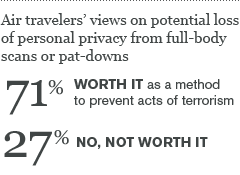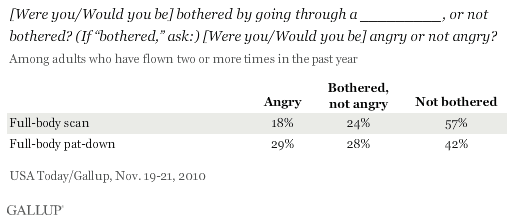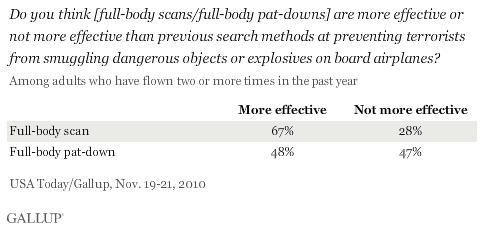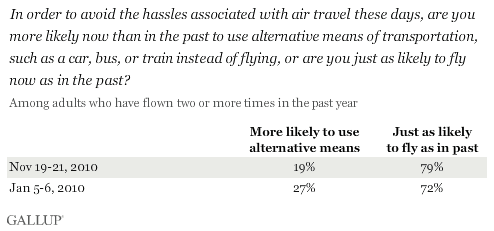 WASHINGTON, D.C. -- Despite a reported uproar about full-body screening procedures now in broader use at U.S. airports and calls for a boycott, Gallup finds that relatively few frequent U.S. air travelers are angry about the new procedures or inclined to cut back on flying as a result. The large majority (71%) of air travelers who have flown at least twice in the past year say any potential loss of personal privacy from the full-body scans and pat-downs is worth it as a means of preventing acts of terrorism.
WASHINGTON, D.C. -- Despite a reported uproar about full-body screening procedures now in broader use at U.S. airports and calls for a boycott, Gallup finds that relatively few frequent U.S. air travelers are angry about the new procedures or inclined to cut back on flying as a result. The large majority (71%) of air travelers who have flown at least twice in the past year say any potential loss of personal privacy from the full-body scans and pat-downs is worth it as a means of preventing acts of terrorism.
The results are from a USA Today/Gallup poll conducted Nov. 19-21, 2010, in which 23% of respondents say they have flown two or more times in the past year. The majority of Americans (62%) say they have not flown at all in the past 12 months, and 15% have flown once.
Gallup asked those who have flown two or more times in the past year about the full-body scans and pat-downs the Transportation Security Administration is now using at many U.S. airports as a means to prevent acts of terrorism. The majority (57%) say they are not bothered by the prospect of undergoing a full-body scan at airport security checkpoints. The same percentage, however, say they are bothered, if not angry, about the prospect of undergoing a full-body pat-down. Still, fewer than one in three frequent air travelers are "angry" about undergoing either procedure.

About one in four (24%) frequent travelers Gallup surveyed say they have already undergone a full-body scan this year, and 15% say they have undergone a pat-down. Notably, more than two-thirds of those who had actually undergone the screening say it did not bother them -- suggesting that the prospect of the procedure is more bothersome than the reality.
Americans' greater comfort with the body scan procedure over the full-body pat-down is evident, as 75% of frequent air travelers say they would choose a full-body scan over a full-body pat-down when going through security; 22% would choose a pat-down.
Regardless of their preferences and whether they had personally undergone one of these procedures, Gallup asked frequent air travelers how effective they perceived these tactics to be at preventing terrorists from smuggling dangerous objects or explosives on board airplanes. Frequent travelers tend to agree that the full-body scans are more effective than other search methods, but are evenly split on the pat-downs. This basic breakdown persists among those who have undergone the procedures.

Overall, relatively few travelers appear fazed enough by the security screenings to change their travel plans. Fewer than 2 in 10 (19%) say they are more likely now than in the past to use alternative means of transportation to avoid the hassles associated with air travel, while 79% say they are just as likely to fly as in the past. These views are no worse than when the increased use of full-body scans began in January.

Implications
Attitudes among frequent U.S. air travelers suggest that the reported uproar over the use of full-body scans and pat-downs at U.S. airports does not reflect how most air travelers feel. The majority are not bothered by the use of full-body scans, which most travelers would choose over the full-body pat-downs they tend to find objectionable and less effective at preventing terrorism. Further, in both cases, those who have already undergone such procedures are less likely to have been bothered or angry than those who have not, suggesting that the prospect of such a screening is more upsetting than the reality.
The large majority of frequent travelers say any potential loss of privacy is worth it to prevent acts of terrorism, which suggests that most Americans accept the Homeland Security Department's rationale for using these tactics. Airlines can also find solace in that air travelers appear no less likely to use other means of travel than they were at the start of the year, when the use of these procedures was less common.
Results for this USA Today/Gallup poll are based on telephone interviews conducted Nov. 19-21, 2010, with a random sample of 3,018 adults, aged 18 and older, living in the continental U.S., selected using random-digit-dial sampling.
For results based on the total sample of national adults, one can say with 95% confidence that the maximum margin of sampling error is ±2 percentage points.
For results based on the sample of 757 frequent air travelers (those who have flown twice or more in the past year), one can say with 95% confidence that the margin of error is ±4 percentage points.
Interviews are conducted with respondents on landline telephones (for respondents with a landline telephone) and cellular phones (for respondents who are cell phone-only). Each sample includes a minimum quota of 150 cell phone-only respondents and 850 landline respondents, with additional minimum quotas among landline respondents for gender within region. Landline respondents are chosen at random within each household on the basis of which member had the most recent birthday.
Samples are weighted by gender, age, race, education, region, and phone lines. Demographic weighting targets are based on the March 2009 Current Population Survey figures for the aged 18 and older non-institutionalized population living in continental U.S. telephone households. All reported margins of sampling error include the computed design effects for weighting and sample design.
In addition to sampling error, question wording and practical difficulties in conducting surveys can introduce error or bias into the findings of public opinion polls.
View methodology, full question results, and trend data.
For more details on Gallup's polling methodology, visit https://www.gallup.com/.
